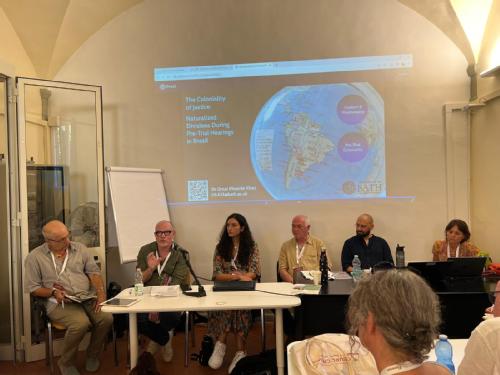News
CJC member, Laura Lammasniemi, releases podcast episode on the concept of consent
CJC co-director, Henrique Carvalho, and CJC member, Anastasia Chamberlen, publish a book on the concept of punishment
The book pulls together discussions and research conducted collaboratively between Henrique and Anastasia over the past 10 years and has just been published (October 6th) by Routledge in their Criminology and Criminal Justice Series. Details are hereLink opens in a new window.
By drawing on a scholarship from law, sociology, criminology, and philosophy the book questions punishment as concept, social phenomenon and contemporary practice. It seeks to examine what are the assumptions underpinning its normalisation and legitimation in society and examines punishment’s targets, objectives and implications. The book also seeks to locate punishment and punitivity within their wider social-cultural contexts. It ultimately aims to unsettle the idea that there is something common-sensical, necessary and unavoidable about punitive justice.
As its title suggests, the book attempts to answer a series of questions, including what punishment is; who punishment’s targets and subjects are; how punishment is perpetuated and experienced; when and where punishment unfolds and finally, why we punish. It ends by considering the implications of this enquiry to understandings of punishment and broader pursuits of justice.
CJC co-director, Henrique Carvalho, and CJC member, Anastasia Chamberlen, win the Howard Journal Best Article Prize 2022
Henrique Carvalho and Anastasia Chamberlen have won the Howard Journal Best article Prize 2022 for their article titled: ‘Feeling the absence of justice: Notes on our pathological reliance on punitive justice’.
This article critically examines our relationship with justice in contemporary Western liberal settings, with a particular focus on why our pursuit of justice is intimately entangled with punitive logics. It starts by arguing that we have a predominantly pathological approach to justice, in the sense that it follows a logic that is akin to that displayed in contemporary sensibilities regarding bodily pain. We deploy Drew Leder’s concept of ‘dys-appearance’ to discuss how, in Western liberal societies, justice is primarily experienced negatively as a phenomenon; that is, we mainly become conscious of justice through the painful and episodic experience of injustice. We then explore this phenomenological quality of justice which, we argue, is linked to how the pursuit of justice in these settings predominantly takes a hostile, punitive aspect. The article concludes by exploring how this punitive impulse can be resisted, through what we term a ‘lived sense of justice’.
You can read the article hereLink opens in a new window.
CJC Members organise panel on decolonisation and criminal justice at the European Society of Criminology Conference 2023
 |
CJC co-Director Ana Aliverti co-organised (with Máximo Sozzo, Universidad Nacional de Litoral) a panel at this year's European Society of Criminology, held in Florence, Italy, on 7th September. The panel was focused on contributions from the book Decolonizing the Criminal Question: Colonial Legacies, Contemporary ProblemsLink opens in a new window (2023, Oxford University Press), which was co-edited by Aliverti and Sozzo together with CJC co-Director Henrique Carvalho and CJC member Anastasia Chamberlen. The panel, which hosted presentations from a number of the book's contributors (see list below), was highly popular, and led to engaging and thought-provoking discussions. The book, which is available Open Access online, offers a serious engagement with the complex issue of decolonisation and its urgency in the areas of criminal justice, criminology and penology. |
CJC directors, Ana Aliverti and Henrique Carvalho, and member, Anastasia Chamberlen, have been awarded the prestigious Leverhulme Trust’s Research Project Grant
The project titled ‘The Vulnerable State: Appraising the Ambivalent Economies of State Power’ explores the ambivalent and shifting governance of socially marginalised groups in the criminal and administrative justice domains. It hypothesises that the state’s treatment of these groups produces a dissonance between objectives of care and control, which reveals profound dilemmas in the exercise of state power in a globalised, unequal world. It empirically examines these moral and emotional dilemmas through the everyday work of frontline officers.
Methodologically, it reconceptualises the study of the state, from the bottom up. Conceptually, it advances a new theory of the state which places moral sentiments and emotions at the heart of its analysis.
It will assess the significance of acknowledging anew a humane side of the state, the resulting contradictions experienced by those who embody state authority on the ground, and the critical potential of humanitarianism for resisting punitiveness from within.
Drawing on a range of methodologies, the project will study the moral and affective economies of state power in two key institutions (criminal and administrative justice) in the governance of social marginality at the macrosocial level (through the analysis of law and policy, operational training and visual material) and microsocial level (through the analysis of institutional decision-making and practices, and individual perceptions and experiences).
The project is made of five distinct yet interconnected subprojects tracing laws and policies, and documenting the work of a range of institutional actors and agencies (the police, the prison, the immigration court, and asylum case-work and support).
